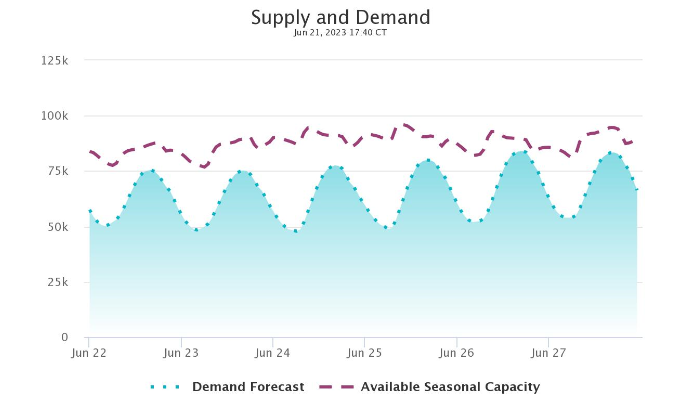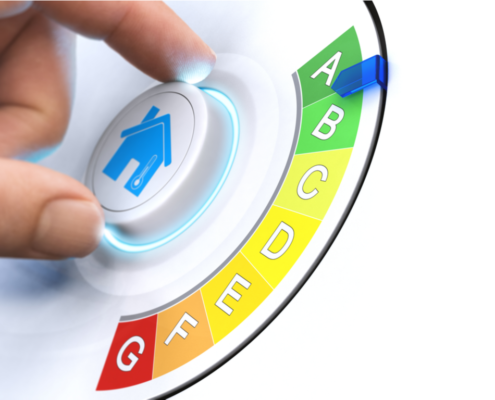Last Updated on June 23, 2023 by Mary Pressler
What is TXANS?
ERCOT introduced the Texas Advisory and Notification System (TXANS) on May 31, 2023. The TXANS system has the main goal of keeping the public informed about power grid conditions in the Lone Star State. Unlike many other resources from ERCOT, which are highly technical, TXANS is designed for a broader audience.
TXANS can be accessed from the ERCOT website, where you can sign up for email notifications. ERCOT also publishes regular updates on Facebook, Twitter and LinkedIn. You can also access TXANS from the ERCOT mobile app, which is available on iOS and Android.
How Does TXANS Work?
TXANS uses four Grid Condition Levels to keep the public informed about the current state of the ERCOT power grid:
| Grid Condition Levels | How Can Energy Consumers Respond? |
| Normal Grid Conditions | No action is needed. The grid is operating normally, with balanced power supply and demand. |
| ERCOT Weather Watch
(Normal Grid Conditions) |
No action is needed yet, but users should monitor updates from ERCOT. The grid is still operating normally, but weather conditions could cause tight demand within the following days.
An ERCOT Weather Watch is normally issued 3-5 days in advance, before the weather event that is expected to cause high demand. For example, a Weather Watch may be issued if an incoming heat wave is expected to cause high air conditioning loads. |
| Voluntary Conservation Notice | ERCOT asks Texans consumers to conserve power voluntarily, if it can be accomplished safely. The grid is facing high demand and/or reduced supply, but it has not reached the point where rolling blackouts are necessary.
Government agencies are asked to implement all available measures to reduce energy consumption in their facilities. This requirement includes city and county offices. |
| Energy Emergency Alert (EEA) | Power conservation becomes critical at this point. You should lower your consumption, if safe to do so.
EEA Level 1 – Reserves are low, but rolling blackouts are not yet required. ERCOT uses all available resources to meet demand. EEA Level 2 – Reserves are even lower. There are no rolling blackouts yet, but ERCOT will disconnect large customers who have agreed to be switched off during emergencies. EEA Level 3 – Reserves are critically low, and ERCOT uses rolling blackouts to keep the grid stable. Your electric service could be interrupted at any time. |
NOTE: The Energy Emergency Alert (EEA) System already existed before TXANS, but it did not provide early warnings based on weather conditions.
Rolling blackouts are only used when ERCOT reaches EEA Level 3, which means the margin between power supply and demand has dropped below 1,000 megawatts (MW).
ERCOT Power Supply and Demand 6-Day Forecast
To complement the TXANS system, ERCOT has added a new dashboard to their website:
In simple words, you can see how electricity generation and consumption are expected to behave during the next six days. When the gap between supply (generation) and demand (consumption) is small, the TXANS system is more likely to reach the Voluntary Conservation Notice and Energy Emergency Alert levels.
For example, here you can see the 6-day forecast published on June 21, covering June 22-27. Supply and demand are both measures in megawatts (MW), shown in the vertical axis. The expected power supply is represented by the dark purple dashed line, and the expected demand is represented by the turquoise dotted line and shaded area.
As you can see in the graph, peak demand is reached in the afternoon, while minimum demand is reached after midnight. This can be explained by the higher temperatures around noon, which drive up the electricity consumption of air conditioners in homes and businesses.
Here you can read more about the grid forecasts for summer 2023, published by ERCOT and NERC (North American Electric Reliability Corporation):
Energy Saving Tips from ERCOT
ERCOT has also published several energy conservation tips in the TXANS website:
- Raise your thermostat by 1-2°F during summer.
- Lower your thermostat by 1-2°F during winter.
- Avoid using large appliances such as washing machines at times of peak demand.
- Switch off and unplug appliances that are not being used.
- If you have a pool, set the pump to operate during the early morning or at night, when grid demand is relatively low.
In the case of businesses, ERCOT recommends switching of air conditioning and heating equipment outside of office hours. Lighting fixtures should be switched off whenever they are not needed, and office equipment can be switched off or placed in sleep mode.
These are just some of the recommendations provided, and you can read about more ways to save energy on the TXANS website.




Leave a Reply
Want to join the discussion?Feel free to contribute!